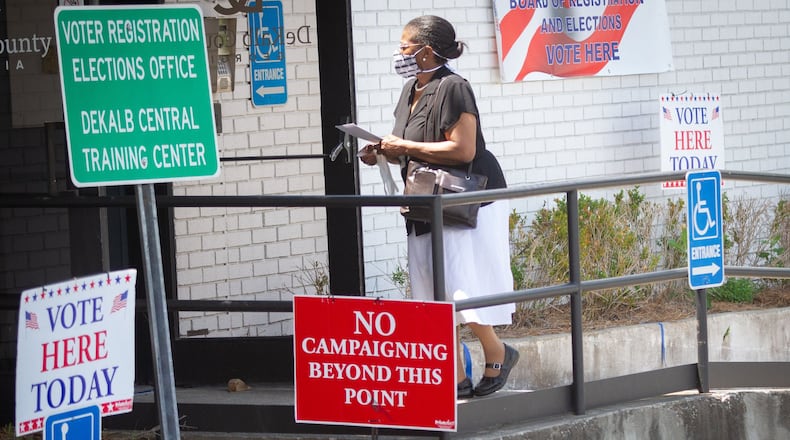Georgia Secretary of State Brad Raffensperger is asking DeKalb County officials to reconsider sending absentee ballot requests to both active and inactive voters ahead of November’s election, saying such a decision “increases the possibility of voter fraud.”
In a Wednesday morning press release, Raffensperger said inactive voter lists often include inaccurate or obsolete mailing addresses.
“Individuals looking to undermine the integrity of Georgia’s elections could use the unclaimed requests to obtain absentee ballots fraudulently in the name of people who have moved elsewhere,” Raffensperger said.
Reached early Wednesday, DeKalb elections board chairman Sam Tillman said he hadn’t seen Raffensperger’s statements. But he wasn’t inclined to reconsider.
“An inactive voter has every right that an active voter has to vote,” Tillman said.
In Georgia, voters are considered inactive after having “no contact” with elections officials for five years, either through voting or by updating their driver’s license information. Voters can also be marked inactive if mail sent by elections officials has been returned as nondeliverable.
Inactive voters are still registered and can cast ballots. They are not eligible to be removed from voter rolls until two years after the five-year no-contact period.
Ahead of June’s primary election, Raffensberger’s office sent absentee ballot applications to Georgia’s 6.9 million active voters, but not to those on the inactive list. The secretary of state has said he has no intention of sending unsolicited applications to any voters ahead of November’s general election.
As of July 21, there were 526,793 active and 28,993 inactive voters in DeKalb, according to the state’s list of registered voters.
“It would be nice if the secretary of state wouldn’t turn running the election statewide into partisan politics,” DeKalb Democrats chairman John Jackson said. “Inactive voters are still registered voters and should be extended the same courtesy that all voters are given.”
Raffensperger is a Republican. DeKalb County is one of the Georgia’s most dependable Democratic strongholds and a recent sparring partner for the secretary of state’s office.
Raffensperger’s press release pointed to the issues the county experienced during June’s primary election (many of which local officials blamed on the state’s new voting system), saying the resources planned for sending ballot applications to inactive voters would be better spent elsewhere.
Said Raffensperger: “Instead of wasting tax dollars, DeKalb should use that money to fulfill its actual duties under Georgia law, which include ensuring that they have sufficient poll workers who are well trained on all equipment and operations, sufficient polling places that can handle the large volume expected in November, and sufficient staff to timely process the absentee ballot requests that do come in.”
The absentee-by-mail voting system has been a topic of national discussion in recent weeks, with President Donald Trump declaring it to be ripe for fraud. Experts say that’s not true.
So does Tillman.
“No one has been able to prove to me that voting absentee by mail creates any fraud problem whatsoever,” he said. “We’ve been doing this in DeKalb County for years and we’ve never had an issue.”
“Unless the secretary of state is issuing an order mandating that we not do this, or telling us not to do this, then as far as I’m concerned nothing is changed,” he added.
Staff writer Mark Niesse contributed to this article.
About the Author
The Latest
Featured



